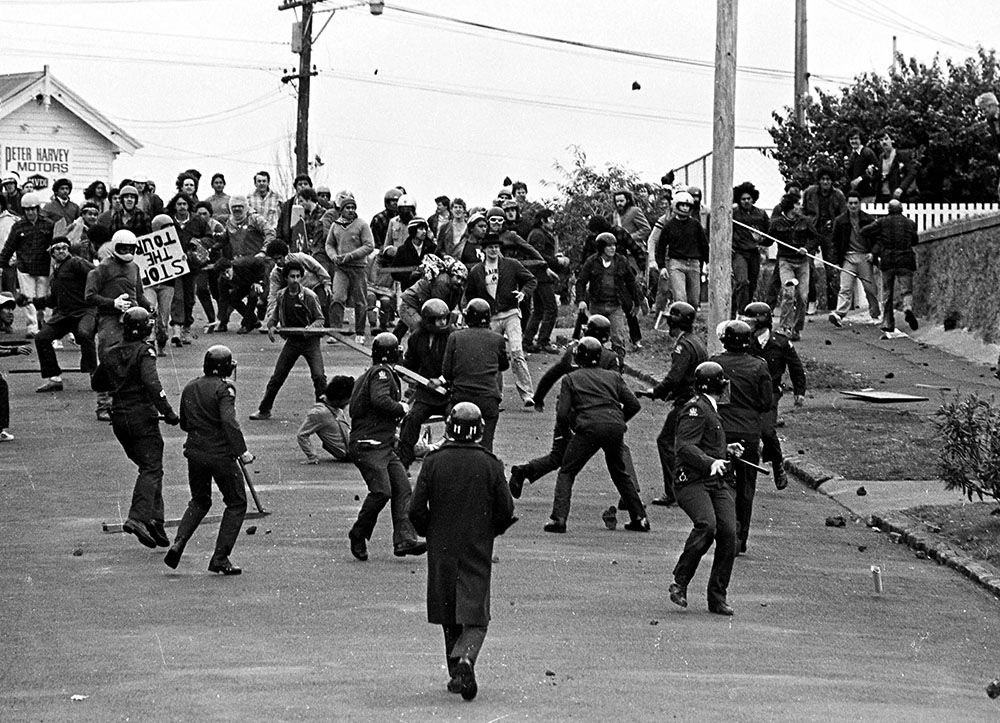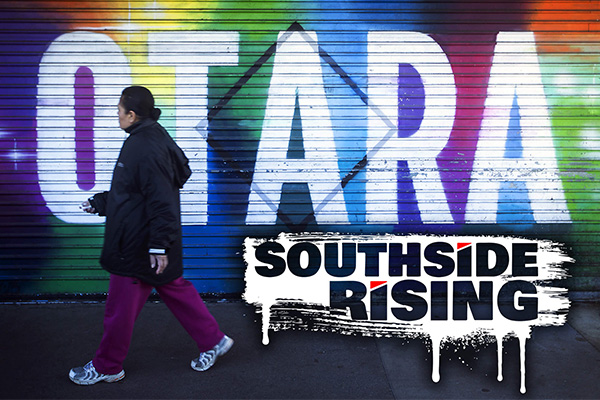

On June 16, 1971, a radical group of Pasifika and Māori men and women confronted state-sanctioned racism to form the Polynesian Panther Party.
Like their navigating ancestors before them, the Panthers guided their people through a nation raging with rugby, racism and beer.
Dressed all in black with afros and berets to match, their counterparts in the United States inspired them to seize the time.
On the 50th anniversary of the party’s formation, Brad Flahive and Alex Liu bring you the stories that led to a homegrown revolution.
Once a Panther
LISTEN to the podcast directly from this page, or through your favourite podcast app, including Apple Podcasts, Google Podcasts, Spotify, and Stitcher.
Identity
Panther Melani Anae takes us through the first waves of Polynesian immigration to Aotearoa and their struggle to find an identity in Auckland’s Pacific Island in the city.

Institution
Panther Alec Toleafoa reveals the brutal tactics used by a government intent on marginalising Polynesians with policies like the Dawn Raids.

Fight Back
Panther Will 'Ilolahia and his ministers find creative ways to keep up the resistance while fighting alongside tangata whenua tests the relationship with their parents.

Division
The need to confront racism ignites a bitterly divided country during the 1981 Springbok Tour. Panther Wayne Toleafoa finds himself in the middle of the violent clashes.

Sacrifice
Fighting against racial oppression takes its toll on Panther Tigilau Ness despite international recognition from leaders like South Africa’s Nelson Mandela.

Always a Panther
Was it worth it? How race relations in NZ today mirror 50 years ago and how young people can be heard.


Reverend Wayne Toleafoa
Wayne Toleafoa was born in New Zealand to Samoan parents.
He joined the Panthers in 1971 and acted as Minister of Information. He left the group in 1975 to work as a teacher and later joined the police force alongside his brother Junior. As a policeman, he clashed with the Panthers during the 1981 Springbok tour protests.
Today, Wayne is a reverend, and lives and works in Hawkes Bay.

Fa'afete 'Fete' Taito
Polynesian Panther youth member

Mere Meanata-Montgomery
Polynesian Panther

Nigel Bhana
Polynesian Panther youth member

Etta Gillon née Schmidt
Polynesian Panther

Miriama 'Ama' Rauhihi Ness
Polynesian Panther

John Minto
Co-founder of HART

Trevor Richards
Co-founder of HART

Dr Oliver Sutherland
Co-founder of ACORD

Joris de Bres
Former secretary of CARE and race relations commissioner (2002-2013)

Roger Fowler
Coordinator of the People's Union

Dr Lyn Doherty
Polynesian Panther and member of the People's Union

Luther Toloa
Former police officer

Dr Paul Spoonley
Distinguished professor and sociologist

Norman Kirk
Prime Minister (1972-1974)

Robert Muldoon
Prime Minister (1975-1984)

David Lange
Former legal advisor to the Polynesian Panthers and Prime Minister (1984-1989)

Allan McCready
Minister of Defence and Minister of Police (1975-1978)
–60s
The first waves of Pasifika migration
As its manufacturing sector expands, New Zealand invites workers from the Pacific to fill labour shortages. Migrants from the Cook Islands, Niue and Tokelau arrive as New Zealand citizens, while Samoans and Tongans require approval. The government later overlooks this requirement as the economy booms.

Archives New Zealand - Te Rua Mahara o te Kāwanatanga Reference: AAQT 6421/B13,891 (GREGORY RIETHMAIER)
Archives New Zealand - Te Rua Mahara o te Kāwanatanga Reference: AAQT 6421/B13,891 (GREGORY RIETHMAIER)

Panthers form
Public opinion begins to turn on the influx of Pasifika migrants due to a slowing economy and rising unemployment. In response to the growing oppression and racism, six young men form the Polynesian Panther Party. Their aim is to strike at the core of racism and give a voice to their community.
Oil crisis and economic downturn
While the UK looks to cut trade with New Zealand and join the European Common Market, an oil crisis sends energy prices sky-high. Kiwis lose jobs and blame Pasifika.


–74
Police Task Force and the Dawn Raids
As media and public pressure grow, the Labour Government creates a specialised Police Task Force to patrol inner-city Auckland streets frequented by Pasifika. Any brown face, regardless of ethnicity, is stopped and asked to provide evidence of the legal right to be in New Zealand. Police also begin raiding the homes, churches and workplaces, often at dawn, of Pasifika suspected to be overstaying their work permits.
1975
Māori Land Hīkoi
Thousands of protesters, led by Dame Whina Cooper, walk the length of the North Island in protest of Māori land alienation. The march lasts one month and ends with the delivery of a petition, signed by various tribal elders, to Parliament. The hīkoi is a watershed moment in the burgeoning Māori cultural renaissance of the 1970s.


1975
Robert Muldoon is elected
After campaigning hard on immigration and the economy, Robert Muldoon and the National Party romp home to victory in the 1975 general election. The new government ramps up the dawn raids and random checking of suspected overstayers, and allows sporting contacts with apartheid South Africa to resume after the previous Labour Government denied the Springbok rugby team entry into New Zealand.
–78
Bastion Point opposition and occupation
Māori-led opposition to the development of a piece of Auckland coastal land sees hundreds of protesters occupy Bastion Point for 506 days from January 5, 1977, until May 25th, 1978. The army and police are sent to violently arrest protesters and tear down buildings erected during the occupation.


Springbok tour protests
Apartheid South Africa accepts an invitation to tour New Zealand. For 56 days starting in July, Kiwis are divided during one of the country’s largest civil disturbances. More than 150,000 people take part in over 200 demonstrations in 28 centres, and 1500 are eventually charged with offences stemming from these protests.
Nelson Mandela visits New Zealand
Nelson Mandela, now free and president of the Republic of South Africa, visits New Zealand. He speaks at St Matthew’s Church in Auckland to a crowd of hundreds of anti-apartheid protesters, thanking them for their support and sacrifice. Panthers Will ‘Ilolahia and Tigilau Ness are in attendance, the latter sharing a hongi with Mandela.

FROM THE ARCHIVES

























12 September 1981 — The Red Squad police unit retreats from anti-tour protesters during the third test of the 1981 Springbok rugby tour. Photographed by Sunday Star-Times photographer John Selkirk.
12 September 1981 — The Red Squad police unit retreats from anti-tour protesters during the third test of the 1981 Springbok rugby tour. Photographed by Sunday Star-Times photographer John Selkirk.



12 September 1981 — A plane piloted by Marx Jones flies low over Eden Park, dropping flour bombs and anti-tour pamphlets during the third test of the 1981 Springbok rugby tour.
12 September 1981 — A plane piloted by Marx Jones flies low over Eden Park, dropping flour bombs and anti-tour pamphlets during the third test of the 1981 Springbok rugby tour.





The Polynesian Panther Party protesting in 1972. Photo by John Miller.
The Polynesian Panther Party protesting in 1972. Photo by John Miller.

29 July 1981 — Baton-wielding police and anti-tour demonstrators clash in Molesworth St, Wellington, during the 1981 Springbok rugby tour. Photographed by Evening Post photographer Ian Mackley.
29 July 1981 — Baton-wielding police and anti-tour demonstrators clash in Molesworth St, Wellington, during the 1981 Springbok rugby tour. Photographed by Evening Post photographer Ian Mackley.


Written, produced, mixed and edited by Alex Liu and Brad Flahive
Stuff podcast director: Adam Dudding
Executive producer: Carol Hirschfeld
Associate producers: Alec Toleafoa, Melani Anae, Tigilau Ness, Wayne Toleafoa and Will ‘Ilolahia
Original music by Andrew Faleatua
Original artwork by Quentin Tohitau-Tauetau
Design and development by Alex Lim
Visual journalist: David White
Digital editor: John Hartevelt
Commissioning editors: Patrick Crewdson and Carol Hirschfeld



Archival audio in this series is from the RNZ collection at Ngā Taonga Sound & Vision

Why? Because the chaotic start to 2021 has underscored the catastrophic effects of misinformation. Inflammatory rhetoric left unchecked - and amplified across social platforms - has harmed how countries have responded to the pandemic, and has damaged democracy.
Stuff’s ethical reporting is built on accuracy, fairness and balance. With millions of New Zealanders turning to us every day, it’s our mission to make Aotearoa a better place.
But the way journalism is funded is changing and we need your help to sustain local newsrooms.
If Stuff is a regular part of your day, please consider becoming a supporter. You can make a contribution from as little as $1. Be part of our story, and help us tell yours.



















